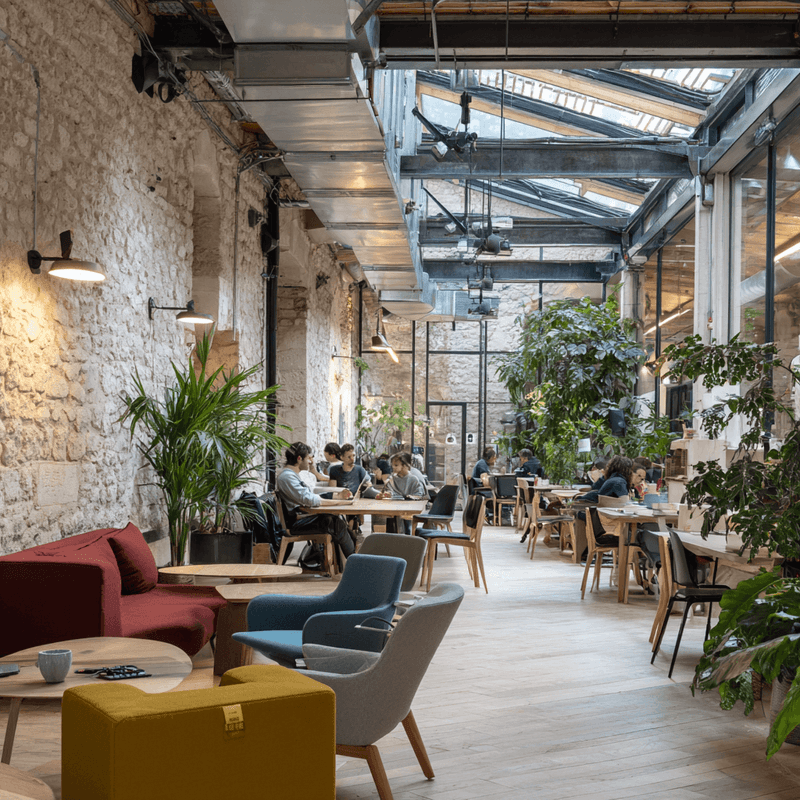
Well, I think we've captured your attention! And rightly so, since company benefits represent a real strategic challenge: they are levers for recruitment, retention and collective performance. In a changing business environment, marked by the rise of teleworking and employees' growing expectations in terms of flexibility, companies are also having to rethink their benefits policies. Bonuses and luncheon vouchers are no longer the only solutions. Among the emerging solutions, flexible workspaces are emerging as a key lever for responding to these changes and attracting talent. We tell you all about it!
Employee benefits: changing expectations
The quest for a better work-life balance is at the heart of employees' expectations. Particularly at a time when the tables have turned, as companies have used a number of arguments in recent years to attract and retain talent.
According to a recent study conducted by Harmonie Mutuelle Groupe VYV, "Nearly nine out of ten employees highly value the presence of company benefits. It's even their number one loyalty criterion, on a par with remuneration policy," notes mutualist expert Sébastien Otto in the columns of the French newspaper Les Echos.
These benefits, once focused on financial aspects such as bonuses and profit-sharing, are now diversifying. Among the most popular fringe benefits, employees prefer high-quality supplementary health insurance (86%), supplementary retirement benefits (77%), employee savings schemes (73%), retirement savings plans (72%), time savings accounts (72%) and other benefits.pargne-temps (72%) et un contrat de prévoyance (72%) ... However, while the security and financial aspects remain the order of the day, WTW's "Global Benefits Attitude Survey" (GBAS) reveals high expectations in terms of flexibility.
Companies must now offer global solutions to meet their teams' aspirations.
From traditional benefits to flexibility
Traditional employee benefits, such as extended health insurance, meal vouchers or company savings plans, remain essential pillars of the company's strategy. However, a shift towards forms of benefits more in tune with new lifestyles is taking place. These include
- Wellness and mental health : Access to health platforms, meditation or yoga sessions, and teleconsultation services have become standard in many companies.
- Support for parenthood : Company crèches , extended parental leave and financial assistance for childcare are among the most popular measures.
- Mobility and sustainability: Encouraging the adoption of green modes of transport, through incentives or subscriptions to soft mobility services, is gaining in popularity.
- Flexible spaces: Telecommuting may be popular, but it also has its limitations: isolation, lack of social ties or difficulties in collaborating effectively. Flexible workspaces offer a balanced solution. These environments, which are modular and adapted to the varied needs of teams, transform the office into a place of choice rather than obligation. Brainstorming rooms, rest areas, nomadic workstations: everything is designed to adjust to the tasks and pace of employees.
Flexible workspaces are not a passing fad. They embody a structural transformation of the working world, where flexibility and well-being are no longer privileges, but legitimate expectations. For companies, the challenge is clear: to rethink their offering in response to these changes, and to ensure that their social policies are both attractive and sustainable. The message is clear: the future of work is flexible, inclusive and people-centred.
-
How can the flexible office reconcile real-estate costs and employee expectations?

05/01/2026 How can the flexible office reconcile real-estate costs and employee expectations?
For decades, the office has been seen as an immutable anchor: an assigned position, a fixed desk, a space designed to accommodate every employee from Monday to Friday, between 9am and 6pm. But this model, long considered indisputable, is now faltering under the impact of profound transformations in the world of work. Massive telecommuting, renewed employee expectations, the search for balance and meaning, and economic pressure on real estate are all forcing organizations to rethink their approach.
-
From cost reduction to cultural transformation: the real challenges of the flexible office

15/12/2025 From cost reduction to cultural transformation: the real challenges of the flexible office
Giving up personal office allocation was no longer seen as an upheaval, but rather as an obvious way of reducing costs, improving real estate efficiency and adapting spaces to contemporary uses. However, the companies that have taken the plunge recognize that the reality far exceeds this initial justification. A genuine cultural transformation was underway!
-
Does coworking restore the value of work?

08/12/2025 Does coworking restore the value of work?
Today, many organizations see Coworking as more than just a real estate service; they see it as a space capable of restoring value to work itself and re-engaging teams. But what exactly is this "value" that coworking claims to restore?